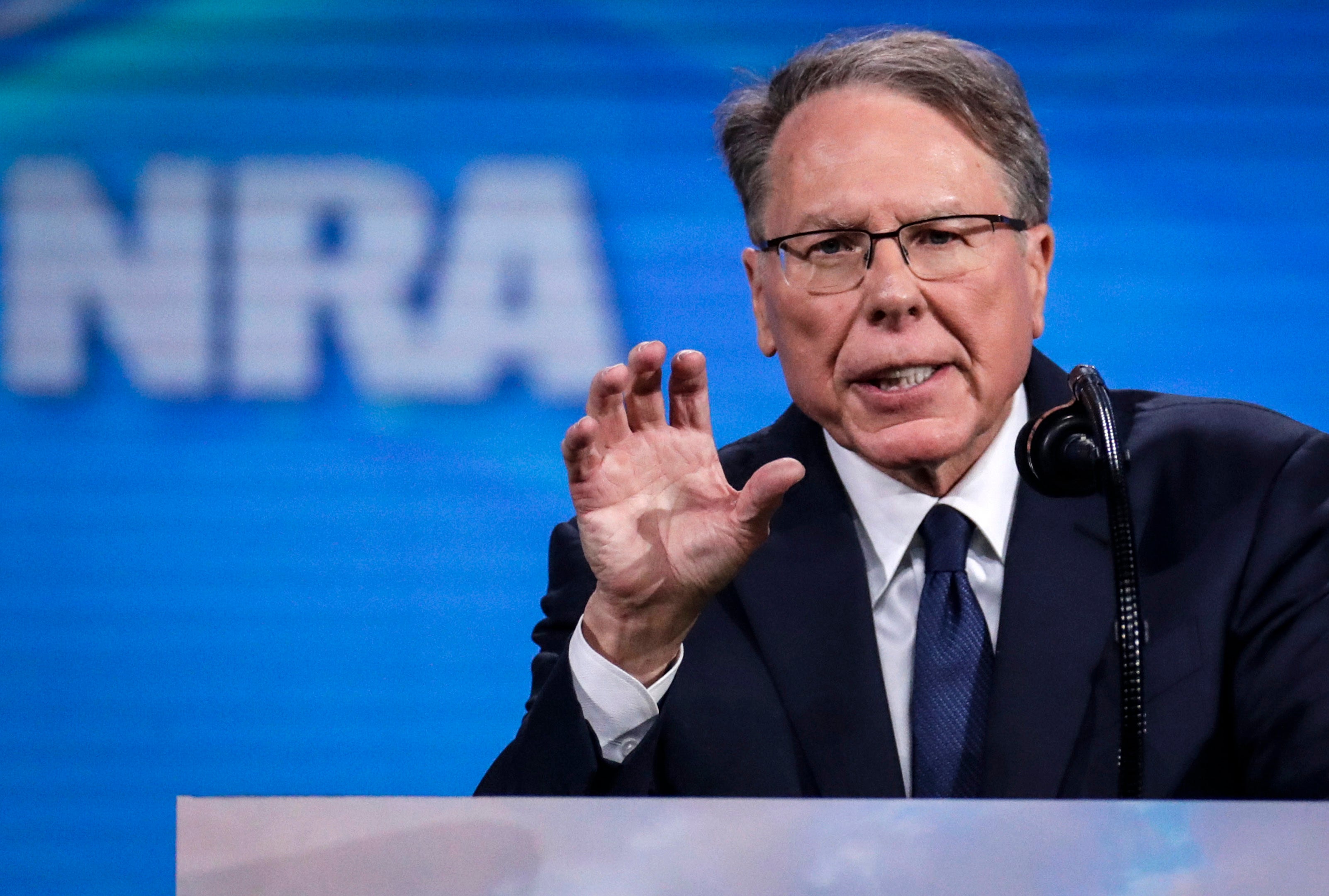Judge blocks NY's bid to shutter NRA, but lawsuit continues
A judge has rejected an effort by New York’s attorney general to put the National Rifle Association out of business, but will allow her lawsuit accusing top executives of illegally diverting tens of millions of dollars from the powerful gun advocacy organization to proceed

Your support helps us to tell the story
From reproductive rights to climate change to Big Tech, The Independent is on the ground when the story is developing. Whether it's investigating the financials of Elon Musk's pro-Trump PAC or producing our latest documentary, 'The A Word', which shines a light on the American women fighting for reproductive rights, we know how important it is to parse out the facts from the messaging.
At such a critical moment in US history, we need reporters on the ground. Your donation allows us to keep sending journalists to speak to both sides of the story.
The Independent is trusted by Americans across the entire political spectrum. And unlike many other quality news outlets, we choose not to lock Americans out of our reporting and analysis with paywalls. We believe quality journalism should be available to everyone, paid for by those who can afford it.
Your support makes all the difference.A judge has rejected an effort by New York's attorney general to put the National Rifle Association out of business, but will allow her lawsuit accusing top executives of illegally diverting tens of millions of dollars from the powerful gun advocacy organization to proceed.
Manhattan Judge Joel M. Cohen said allegations of NRA officials misspending on personal trips, no-show contracts and other questionable expenditures can be addressed by other remedies, such as fines and restitution, and do not warrant the “corporate death penalty” that Attorney General Letitia James had sought.
James' lawsuit, filed in August 2020, tells “a grim story of greed, self-dealing, and lax financial oversight" at the NRA's highest levels, but it does not allege any financial misconduct benefited the organization or harmed the public, or that the NRA is incapable of “continuing its legitimate activities on behalf of its millions of members,” Cohen wrote in a 42-page decision.
The judge also raised concerns that shutting down the NRA could impinge the free speech and assembly rights of its millions of members. Nevertheless, he said, James' lawsuit can continue against the NRA, its longtime leader Wayne LaPierre, and three other people who have served as executives with the organization. The NRA, LaPierre and one other defendant had filed motions to dismiss the case.
“While we’re heartened that the judge rejected the NRA’s attempts to thwart most of the claims in our case against the NRA, we are disappointed that the judge ruled against the dissolution portion of the case,” James said in a statement. “We are considering our legal options with respect to this ruling. We remain committed to enforcing New York law regardless of how powerful any individual or organization may be.”
Messages seeking comment were left with a spokesperson for NRA and with lawyers for the other defendants: LaPierre; general counsel John Frazer; former treasurer Wilson Phillips; and former chief of staff Joshua Powell.
In a court filing last year, lawyers for the organization called the lawsuit brought by James, a Democrat, “a blatant and malicious retaliation campaign against the NRA and its constituents based on her disagreement with the content of their speech.”
James is seeking to ban LaPierre and the three others from serving in the leadership of any not-for-profit or charitable organization conducting business in New York, which would effectively remove them from any involvement with the NRA.
LaPierre, the CEO who has been in charge of the NRA's day-to-day operations since 1991, is accused in the lawsuit of spending millions on private travel and personal security and accepting expensive gifts — such as African safaris and use of a 107-foot (32-meter) yacht — from vendors.
He is also accused of setting himself up with a $17 million contract with the NRA if he were to exit the organization, spending NRA money on travel consultants, luxury car services, and private jet flights for himself and his family — including more than $500,000 on eight trips to the Bahamas over a three-year span.
Some of the NRA’s excess spending was kept secret, the lawsuit said, under an arrangement with the organization’s former advertising agency, Ackerman McQueen. The advertising firm would pick up the tab for expenses for LaPierre and other NRA executives and then send a lump sum bill to the organization for “out-of-pocket expenses,” the lawsuit said.
Though headquartered in Virginia, the NRA was chartered as a nonprofit in New York in 1871 and is incorporated in the state. James is the state’s chief law enforcement officer and has regulatory power over nonprofit organizations incorporated in the state, such as the NRA. In the lawsuit, James' office argued that one way to remedy the alleged misspending at the organization was by closing it down.
In January 2021, the NRA declared bankruptcy and sought to move its state of incorporation from New York to Texas, but a judge blocked the move, saying the NRA’s bankruptcy was not filed in good faith. In the process, the NRA had made clear it sought to escape regulatory oversight in New York, in part because of the lawsuit's threat to its existence.
___
Follow Michael Sisak on Twitter at twitter.com/mikesisak